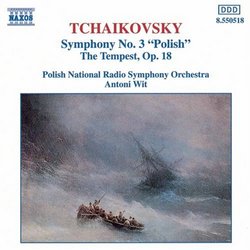| All Artists: Pyotr Il'yich Tchaikovsky, Antoni Wit, Polish Radio and Television National Symphony Orchestra Title: Tchaikovsky: Symphony No. 3 "Polish"; The Tempest, Op. 18 Members Wishing: 0 Total Copies: 0 Label: Naxos Original Release Date: 1/1/1993 Re-Release Date: 2/15/1994 Genre: Classical Style: Symphonies Number of Discs: 1 SwapaCD Credits: 1 UPCs: 730099551823, 4891030505186 |
Search - Pyotr Il'yich Tchaikovsky, Antoni Wit, Polish Radio and Television National Symphony Orchestra :: Tchaikovsky: Symphony No. 3 "Polish"; The Tempest, Op. 18
CD DetailsSimilar CDs
|
CD ReviewsWit's Tchaikovsky Joshua Grasso | Oxford, OH USA | 08/23/2005 (5 out of 5 stars) "Antoni Wit is a remarkable conductor with a surprising range: he does everything from Schumann to Penderecki with considerable elan and intelligence. It's conductors like Wit who are steadily making Naxos a label to reckon with, rather than a cheap alternative to more expensive and impressive recordings. One of Wit's highlights on Naxos are his thrilling Tchaikovsky recordings--though sadly, he's only recorded Symphonies 3 and 5, and the piano concertos (Leaper does the rest). I have listened to many versions of the so-called "Polish" symphony, and this remains my favorite for its color and enthusiasm. Not to mention a beautiful rendition of the much maligned Tempest Overture, which Wit makes seem like a masterpiece just a step below Romeo and Juliet. Wit makes the weaker movements of the symphony (the first and last movements) seem purposeful and exciting, and the recurring theme in the finale never gets old in his hands. The middle movements, however, are simply iridescent: I have never heard the slow movement "sing" as clearly as this recording. It makes you think Tchaikovsky never wrote anything better! The scherzo, too, is amazing--great music making that deserves slightly clearer sound, but this is a minor quibble. If you aren't a fan of The Tempest, or dismiss it as second-rate Tchaikovsky, listen to the enormous storm sequence in the opening, which builds to a thrilling sonic climax. The love theme is particularly well handled, as it never dissolves into a maudlin display of sentiment; it's touching and extremely memorable, and carries the Overture to its inevitable, and very Tchaikovskian, conclusion. I would love to hear Wit's 1st and 2nd, as well as a recording of the complete Tchaikovsky Overtures (Naxos released a CD of three, but only one by Wit--The Tempest). I strongly recommend this disc as a way to reevaluate a neglected symphony and appreciate an amazing talent in the wand of Antoni Wit." The best "Polish" Symphony recording I know Alan Majeska | Bad Axe, MI, USA | 11/05/2005 (5 out of 5 stars) "Tchaikovsky's "Polish" Symphony, the 3rd of his 6 completed Symphonies, is in 5 movements, so is a contrast to the 4 movement pattern of Symphonies 1,2,4,5, and 6. Antoni Wit and the Polish National Radio Orchestra turn in the best recording I've heard of this work, and I'm familiar with other recordings by Abravanel/Utah (Vox), Bernstein/New York (Sony), Abbado/Chicago (Sony), and Karajan/Berlin (DG). The acoustic environment this was recorded in has a slight reverb which really highlights what the Polish orchestra is doing, but doesn't blur details. The full sound of the orchestra is really beautiful: rich and thick textured where needed, but everything is at the same time clear and able to be heard. The Abravanel, Bernstein and Abbado recordings above were all recorded in more dry acoustic environments, and the Bernstein especially suffers from some scrappy playing with the New York Philharmonic, although his ending of V is very exciting. If the opening, slow introduction of Wit's recording doesn't light you on fire, don't worry, and be patient: it gets MUCH better. The Allegro section of I is very exciting, and fiery without going over the top. II is calmer and more reflective, III a true elegy: sad and introspective. IV is a Mendelssohn like scherzo, with V at a perfect tempo: neither too fast or slow, for the Polacca rhythm to make it's full impact. The Polish Radio orchestra, if not the equal of the Berlin Philharmonic, for example, sure outplay them in this work. (Karajan's DG recording is not recommendable: it's the poorest work I've ever heard from Mr. Karajan.) Naxos also includes "The Tempest" a seldom heard orchestral piece, as a bonus. As in the symphony, there is a slight reverb, and the overall sound is warm and very lifelike. This is not cold, harsh digital sound common in some DDD recordings of the early 1980s. You can't go wrong with this: bargain price, especially from Amazon.com, and the best "Polish" Symphony recording around!" A Work That Does Not Get The Attention It Deserves Timothy Kearney | Hull, MA United States | 01/29/2006 (5 out of 5 stars) "For probably the better part of the century between Tchaikovsky's death and the present day, three of his symphonies were heard regularly in performance, and three were not. Symphony #4 with its majestic brass solos at the beginning, the fifth symphony, and his final symphony, his sixth "Pathetique" still are performed regularly in concert. Excellent recordings of his second, most notably the Leonard Slatkin recording with the St. Louis Symphony, has caused listeners to discover the magic of this work, but his first and third symphonies, even though they are filled with glorious music, still seem relegated to rare performances. It's likely that outside of Russia, even people who attend symphonic concerts on a regular basis have not heard the first and third symphonies in concert. Fortunately there are good recordings of this work and this CD from Naxos is an excellent example.
The symphony itself is structured somewhat differently from his other five in that it has five movements rather than four. This work was written early in Tchaikovsky's career, so we see him experimenting a bit with ideas that will later be his hallmark. While it may not be as polished as his fifth or as engaging as his sixth, it's still a great work. Personally I enjoy it more than his fourth, which critics and audiences seem to love. It seems to be less restricted than his later works. Antoni Wit recorded the entire six symphonies of Tchaikovsky for Naxos. Like his recording of Tchaikovsky's First Symphony, Wit has an appreciation fro the nuances of Tchaikovsky's music and conducts a lively performance of the work. For anyone who is familiar with Tchaikovsky's music and has a fair to poor recording of a Tchaikovsky work knows all too well, the conductor must keep the tempo of his music or else it is deadly and Wit does this well. The recording also includes a good performance his musical poem THE TEMPEST. I decided to purchase this recording based on Wit's conducting of Tchaikovsky's First Symphony. I thoroughly enjoyed Wit's recording of the First Symphony, which I do feel is one of the best recordings of the work and assumed he would have the same style and vigor with Symphony #3. I discovered this to be the case and have enjoyed since I purchased it. Hopefully you will too as you rediscover a well loved and familiar work or a symphony you are just discovering. " |


 Track Listings (6) - Disc #1
Track Listings (6) - Disc #1




